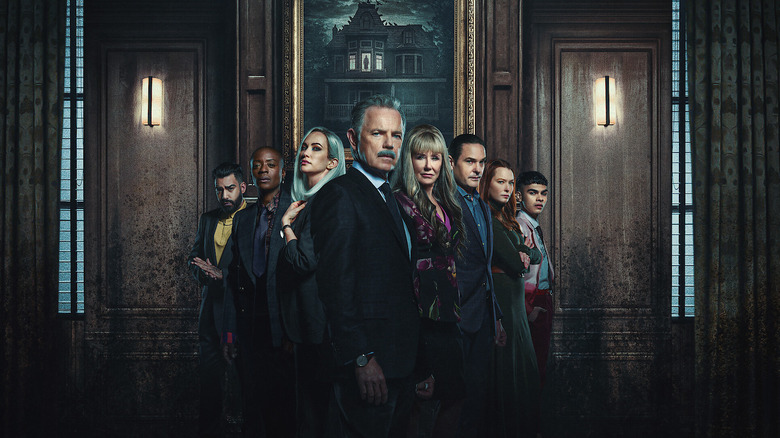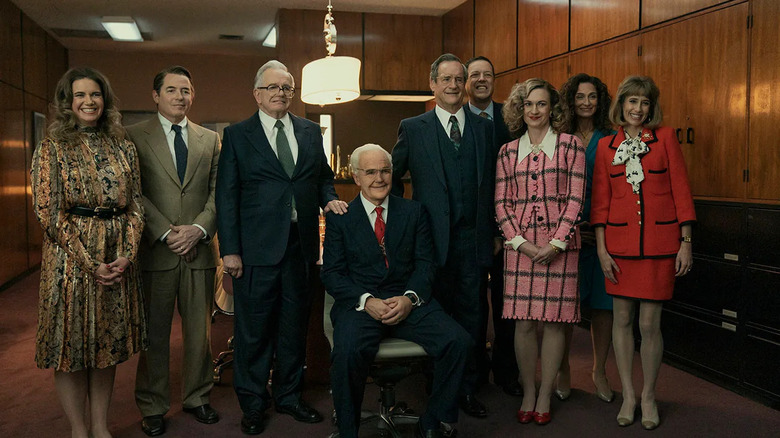How The Fall Of The House Of Usher Draws On The Opioid Crisis As Inspiration For Its Awful Family
Medical horror has always been central to the mysterious Edgar Allan Poe short story, "The Fall of the House of Usher." It opens when an unnamed narrator receives a letter from the ill Roderick Usher, whose sister, Madeline is experiencing cataleptic trances from an illness of her own. When she eventually passes, Roderick fears her body will be analyzed for medical study and embalmed. Instead of giving her over for an autopsy, Roderick decides to keep her in the family tomb for two weeks. Alas, in typical Poe fashion, it is revealed at the end that Madeline was entombed before she had actually passed.
In Mike Flanagan's "The Fall of the House of Usher," the titular family's relationship with medicine is generational. In this updated story, Roderick and Madeline's mother Eliza worked for a pharmaceutical company while also being a devout woman who believed God could heal better than any medicine. Witnessing the aftermath of their mother's beliefs motivates the siblings to ensure their lives, and the lives of their family will never resemble that of their upbringing — taking over the pharmaceutical industry and becoming one of the most powerful familial dynasties in America. That is until their heirs all die in mysterious ways ... and I mean, all of them.
Roderick Usher (Bruce Greenwood) sits in his crumbling house as investigator C. Auguste Dupin (Carl Lumbly) arrives to hear his story. His company is under investigation for popularizing a highly addictive opioid, leading to the death of countless patients. Dupin thinks he's going to hear the truth about the company's knowledge of the opioids, but instead hears the full story of the Usher family, and how this empire was doomed to fall from the beginning. It's a fantastic update to the classic tale, only emphasized by its connection to a real-life family of medical monsters.
The fall of the Sackler family
While the Usher family is a fictional creation by Poe, their interpretation through Mike Flanagan is heavily inspired by the Sackler family, an American family who owned the pharmaceutical company Purdue Pharma and later founded Mundipharma. The company was sued many, many times for the overprescription of addictive pharmaceutical drugs like OxyContin, and is still undergoing legal battles to this day. The past few years have seen a number of projects centered on the Sacklers, including Hulu's "Dopesick," Netflix's "Painkiller," the HBO documentary, "Crime of the Century," and the Academy Award-nominated documentary, "All the Beauty and the Bloodshed." But it is arguably "The Fall of the House of Usher" that gives the family its most honest look yet.
The new Netflix series isn't trying to draw a 1-to-1 comparison between the Sacklers and the fictional Ushers, but certainly revels in the catharsis of watching a horrible family get what they have coming to them. At the same time, despite the supernatural elements plaguing the Ushers, the series never forgets that the most monstrous acts are those committed by the family themselves. There's a healthy dose of schadenfreude watching the House of Usher fall to the ground, witnessing the justice of the universe dropped onto the Usher family as the Sackler family continues to dodge accountability. Unlike previous Flanagan efforts like "The Haunting of Hill House" or "Midnight Mass," this is not a story using horror as an allegory for human turmoils like grief or faith, but in the same manner as Poe's story — it's a morality tale.
Art imitates life imitates art
The Sackler family has been described as the "most evil family in America" by multiple publications, but their actions — like those of the fictional Ushers — exist in different forms. The first generation of the Sackler family dynasty was ruthless, but also pioneers in medication that helped put an end to the practice of lobotomies. Additionally, they were groundbreaking in their fight to end segregation in blood banks. They came up with the idea to market medication directly to doctors, a practice that exists still today.
The road to hell is paved with good intentions and whatnot. Their children and children's children were born into the Sackler's established success and would do anything to increase their power and wealth. "Was it ever going to be enough?" Dupin asks Roderick Usher, echoing the same question analysts and pundits have been asking the Sacklers for years.
"The Fall of the House of Usher" is to the Sackler family what "Succession" was to the Murdoch family, but by rooting the story in horror instead of drama, it allows a safe distance for the audience to process the real tragedies caused by the Sacklers. Since 1999, over a million people have died in opioid-related deaths, meaning there's a high probability some of you reading this article — and myself, writing it — have lost someone to the opioid crisis. Having to face that reality is difficult and can spark an overwhelming wave of conflicting emotions. Seeing an avatar for the family that had a hand in all of that turmoil reach such extreme comeuppance in "The Fall of the House of Usher" is exactly what the doctor ordered.


